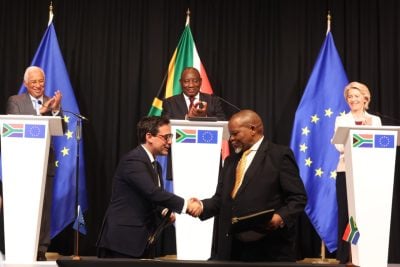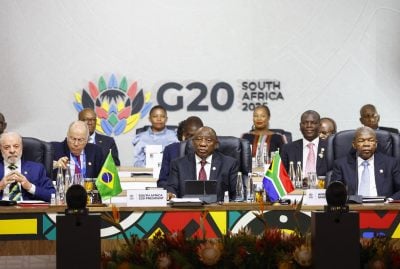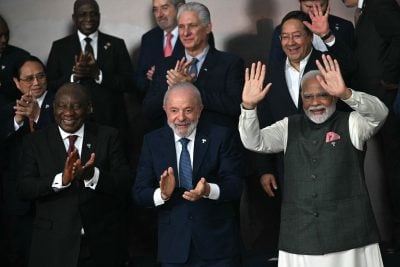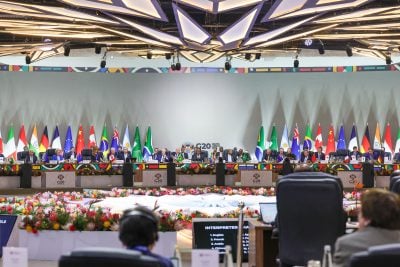South Africa’s vision to make the G20 deliberations and outcomes resonate with the rest of the continent has resulted in strategic visibility for Africa under the umbrella of this high-level initiative.
The themes of the year-long presidency, Solidarity, Equality and Sustainability, frame South Africa’s leadership as not being purely country driven, but one broadly focused on development and inclusivity.
The African Continental Free Trade Area (AfCFTA) was a continuous central theme throughout South Africa’s 2025 presidency, appearing in many statements, ministerial meetings, working groups and Africa-focused side meetings.
The final declaration issued by the G20, read out by President Cyril Ramaphosa at the end of the Leaders’ Summit, linked G20 trade and investment cooperation directly to AfCFTA implementation.
It acknowledged that regional economic integration, including the AfCFTA, is a key enabler of economic growth, resilience, investment and development.
The declaration noted a “G20 Africa Cooperation Agenda on Trade and Investment” promoted by the South African presidency. This is a voluntary and non-binding initiative that is not legally enforceable but provides a roadmap for cooperation and investment.
The aim is to mobilise investment into Africa’s productive sectors including manufacturing, agriculture, pharmaceuticals and critical minerals and into infrastructure, with an emphasis on regional infrastructure.
The agenda, which includes many existing initiatives, will be overseen by the African Union and African Development Bank.
Africa had an additional voice at the table through the membership of the African Union, this year represented by Angola’s president as the current chair of the AU. The AU’s first summit was in 2024 under Brazil’s presidency.
SA has long pressed for the reform of global financial institutions, greater representation of the Global South, and recognition of Africa’s economic weight.
South Africa was a founding member of the G20 in 1999, chosen on the basis of it being the most sophisticated and diversified economy on the continent.
It has, over the past few years, pushed for AU membership to enhance the continent’s voice. The lobbying was successful and in 2023, at the G20 summit in India, the AU was granted permanent membership.
Of the 42 countries and institutions that attended the Leaders’ Summit in Johannesburg, many were presidents and officials from other African countries, including Zimbabwe, Nigeria, Equatorial Guinea, Kenya, Egypt, Namibia and Ethiopia.
Ramaphosa met many of them on the sidelines of the main event and in other forums to ensure the G20 legacy is aligned to African development aspirations, the government said.
Nigeria hosted a G20 meeting, the first outside South Africa during the year. It was a G20 Africa Outreach Meeting on Industrialisation and Agriculture.
Common issues for Africa
The AfCTA is a central thread that has run through discussions and have touched on many of the projects and initiatives announced by and around the G20, covering many other common issues affecting the whole continent.
These include industrialisation, climate funding, debt sustainability and the reform of global financial institutions, which aim to ease the burden of African countries and promote growth and development.
South Africa established cross-cutting G20 task forces on issues that matter for Africa such as inclusive economic growth, food security and artificial intelligence.
Inequality was a key theme at the event. South Africa commissioned an Extraordinary Committee of Independent Experts on Global Inequality, chaired by Nobel Prize-winning economist Joseph Stiglitz, which produced the G20’s first-ever report on global inequality.
South Africa, Namibia, Botswana and Zimbabwe are among the most unequal countries in the world and the Stiglitz report found that global inequality is worsening, with the wealthiest 1% capturing 41% of all new wealth between 2020 and 2024, and the bottom 50% only 1%.
The Africa Engagement Framework is another continental initiative driven under the G20. A multi-year initiative, it is intended to deepen and institutionalise G20 support for Africa’s economic and financial development. This also underpins the essence of the AfCFTA.
The goal of this legacy initiative is to align G20 financial and economic support with African development priorities — not just on a project-by-project basis, but through coordinated, systemic engagement.
It was officially endorsed by G20 Finance Ministers and Central Bank Governors in October 2025, and South Africa has committed to coordinating and resourcing the initiative until 2030.
A complementary initiative, the G20 Compact with Africa, founded in 2017, entered its second phase (2025-2033) at the Johannesburg event and new financing was pledged to mobilise investment in Africa and support structural and business climate reforms.
Member countries in Africa must meet reform criteria in order to benefit from it. Zambia and Angola are the newest members, while the World Bank and the African Development Bank act as coordinators and facilitators.
Legacy projects
Industrialisation was another key platform, focusing largely on critical minerals. South Africa advanced a critical minerals initiative that emphasises value addition, beneficiation, and inclusive supply chains, rather than just extraction.
The G20 Critical Minerals Framework emanated from the South African process. It is a voluntary blueprint for international cooperation and provides a template for African countries to follow in pursuing opportunities related to critical minerals.
The Ubuntu Legacy Initiative is yet another Africa-focused legacy project to catalyse cross-border infrastructure development, including a toolkit produced by the African Development Bank.
Climate issues were a large part of the final G20 Declaration. Issues raised were the need to scale up climate finance, build capacity and transfer technology to developing countries, which would help African nations access more concessional, climate-focused funding.
South Africa elevated disaster resilience (especially climate-induced natural disasters) to a leaders-level issue in the G20, arguing strongly that vulnerable countries (many in Africa) need more support.
In its final declaration, it committed the G20 to investing in disaster finance mechanisms such as insurance, risk pools, catastrophe bonds and contingent credit to help countries facing increasing climate-related disasters. It also reaffirmed support for “just transition pathways”, which will help African countries to move to low-carbon sustainable models.
Infrastructure was also on the menu, with the Ubuntu Legacy Initiative being one of South Africa’s legacy projects. The goal is to accelerate cross-border infrastructure in Africa, promoting regional integration and economic development, using a toolkit developed by the African Development Bank to help countries overcome common barriers to building infrastructure.
These are among the initiatives discussed, committed to or drawn up under the G20 presidency of South Africa ensuring that the Africa’s own issues, needs and challenges remained on the radar through the year and continue through legacy projects.

 Sign in with Google
Sign in with Google 



